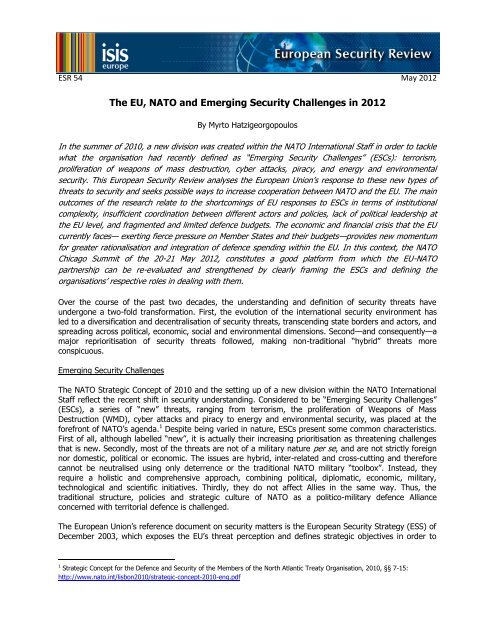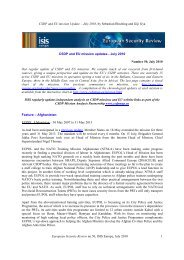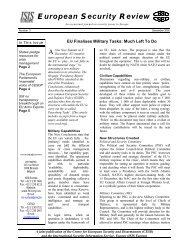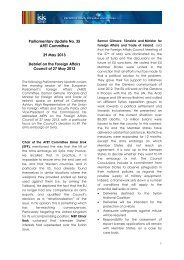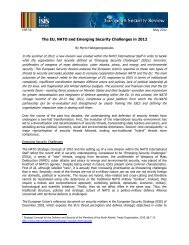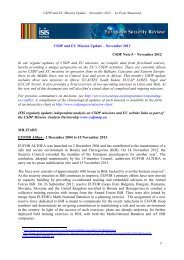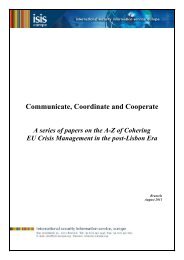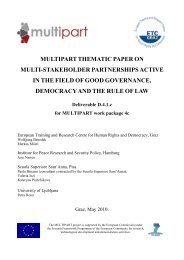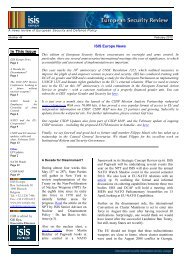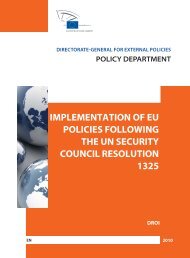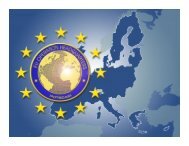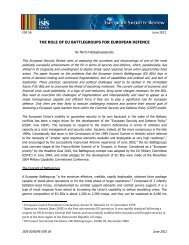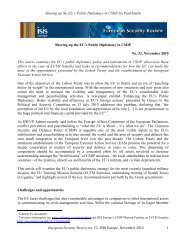The EU, NATO and Emerging Security Challenges in ... - ISIS Europe
The EU, NATO and Emerging Security Challenges in ... - ISIS Europe
The EU, NATO and Emerging Security Challenges in ... - ISIS Europe
You also want an ePaper? Increase the reach of your titles
YUMPU automatically turns print PDFs into web optimized ePapers that Google loves.
ESR 54 May 2012<br />
<strong>The</strong> <strong>EU</strong>, <strong>NATO</strong> <strong>and</strong> <strong>Emerg<strong>in</strong>g</strong> <strong>Security</strong> <strong>Challenges</strong> <strong>in</strong> 2012<br />
By Myrto Hatzigeorgopoulos<br />
In the summer of 2010, a new division was created with<strong>in</strong> the <strong>NATO</strong> International Staff <strong>in</strong> order to tackle<br />
what the organisation had recently def<strong>in</strong>ed as “<strong>Emerg<strong>in</strong>g</strong> <strong>Security</strong> <strong>Challenges</strong>” (ESCs): terrorism,<br />
proliferation of weapons of mass destruction, cyber attacks, piracy, <strong>and</strong> energy <strong>and</strong> environmental<br />
security. This <strong>Europe</strong>an <strong>Security</strong> Review analyses the <strong>Europe</strong>an Union’s response to these new types of<br />
threats to security <strong>and</strong> seeks possible ways to <strong>in</strong>crease cooperation between <strong>NATO</strong> <strong>and</strong> the <strong>EU</strong>. <strong>The</strong> ma<strong>in</strong><br />
outcomes of the research relate to the shortcom<strong>in</strong>gs of <strong>EU</strong> responses to ESCs <strong>in</strong> terms of <strong>in</strong>stitutional<br />
complexity, <strong>in</strong>sufficient coord<strong>in</strong>ation between different actors <strong>and</strong> policies, lack of political leadership at<br />
the <strong>EU</strong> level, <strong>and</strong> fragmented <strong>and</strong> limited defence budgets. <strong>The</strong> economic <strong>and</strong> f<strong>in</strong>ancial crisis that the <strong>EU</strong><br />
currently faces— exert<strong>in</strong>g fierce pressure on Member States <strong>and</strong> their budgets—provides new momentum<br />
for greater rationalisation <strong>and</strong> <strong>in</strong>tegration of defence spend<strong>in</strong>g with<strong>in</strong> the <strong>EU</strong>. In this context, the <strong>NATO</strong><br />
Chicago Summit of the 20-21 May 2012, constitutes a good platform from which the <strong>EU</strong>-<strong>NATO</strong><br />
partnership can be re-evaluated <strong>and</strong> strengthened by clearly fram<strong>in</strong>g the ESCs <strong>and</strong> def<strong>in</strong><strong>in</strong>g the<br />
organisations’ respective roles <strong>in</strong> deal<strong>in</strong>g with them.<br />
Over the course of the past two decades, the underst<strong>and</strong><strong>in</strong>g <strong>and</strong> def<strong>in</strong>ition of security threats have<br />
undergone a two-fold transformation. First, the evolution of the <strong>in</strong>ternational security environment has<br />
led to a diversification <strong>and</strong> decentralisation of security threats, transcend<strong>in</strong>g state borders <strong>and</strong> actors, <strong>and</strong><br />
spread<strong>in</strong>g across political, economic, social <strong>and</strong> environmental dimensions. Second—<strong>and</strong> consequently—a<br />
major reprioritisation of security threats followed, mak<strong>in</strong>g non-traditional “hybrid” threats more<br />
conspicuous.<br />
<strong>Emerg<strong>in</strong>g</strong> <strong>Security</strong> <strong>Challenges</strong><br />
<strong>The</strong> <strong>NATO</strong> Strategic Concept of 2010 <strong>and</strong> the sett<strong>in</strong>g up of a new division with<strong>in</strong> the <strong>NATO</strong> International<br />
Staff reflect the recent shift <strong>in</strong> security underst<strong>and</strong><strong>in</strong>g. Considered to be “<strong>Emerg<strong>in</strong>g</strong> <strong>Security</strong> <strong>Challenges</strong>”<br />
(ESCs), a series of “new” threats, rang<strong>in</strong>g from terrorism, the proliferation of Weapons of Mass<br />
Destruction (WMD), cyber attacks <strong>and</strong> piracy to energy <strong>and</strong> environmental security, was placed at the<br />
forefront of <strong>NATO</strong>’s agenda. 1 Despite be<strong>in</strong>g varied <strong>in</strong> nature, ESCs present some common characteristics.<br />
First of all, although labelled “new”, it is actually their <strong>in</strong>creas<strong>in</strong>g prioritisation as threaten<strong>in</strong>g challenges<br />
that is new. Secondly, most of the threats are not of a military nature per se, <strong>and</strong> are not strictly foreign<br />
nor domestic, political or economic. <strong>The</strong> issues are hybrid, <strong>in</strong>ter-related <strong>and</strong> cross-cutt<strong>in</strong>g <strong>and</strong> therefore<br />
cannot be neutralised us<strong>in</strong>g only deterrence or the traditional <strong>NATO</strong> military “toolbox”. Instead, they<br />
require a holistic <strong>and</strong> comprehensive approach, comb<strong>in</strong><strong>in</strong>g political, diplomatic, economic, military,<br />
technological <strong>and</strong> scientific <strong>in</strong>itiatives. Thirdly, they do not affect Allies <strong>in</strong> the same way. Thus, the<br />
traditional structure, policies <strong>and</strong> strategic culture of <strong>NATO</strong> as a politico-military defence Alliance<br />
concerned with territorial defence is challenged.<br />
<strong>The</strong> <strong>Europe</strong>an Union’s reference document on security matters is the <strong>Europe</strong>an <strong>Security</strong> Strategy (ESS) of<br />
December 2003, which exposes the <strong>EU</strong>’s threat perception <strong>and</strong> def<strong>in</strong>es strategic objectives <strong>in</strong> order to<br />
1 Strategic Concept for the Defence <strong>and</strong> <strong>Security</strong> of the Members of the North Atlantic Treaty Organisation, 2010, §§ 7-15:<br />
http://www.nato.<strong>in</strong>t/lisbon2010/strategic-concept-2010-eng.pdf
<strong>The</strong> <strong>EU</strong>, <strong>NATO</strong> <strong>and</strong> <strong>Emerg<strong>in</strong>g</strong> <strong>Security</strong> <strong>Challenges</strong> <strong>in</strong> 2012, by Myrto Hatzigeorgopoulos 2<br />
achieve a “secure <strong>Europe</strong> <strong>in</strong> a better world”. 2 This document outl<strong>in</strong>es five ma<strong>in</strong> security threats:<br />
terrorism, the proliferation of WMDs, regional conflict, state failure <strong>and</strong> organised crime. <strong>The</strong> ESS was<br />
complemented by the 2008 Report on the Implementation of the <strong>Europe</strong>an <strong>Security</strong> Strategy which<br />
added some “new” challenges to the orig<strong>in</strong>al list. <strong>The</strong> <strong>EU</strong>’s threat assessment was comparable to <strong>NATO</strong>’s<br />
Strategic Concept, although the ESS did not focus as much on climate change, cyber security, <strong>and</strong> piracy.<br />
<strong>The</strong>re is a common underst<strong>and</strong><strong>in</strong>g between the <strong>EU</strong> <strong>and</strong> <strong>NATO</strong> about the nature of the pr<strong>in</strong>cipal security<br />
challenges of the 21 st century. However, whereas the <strong>EU</strong> appears to be very focused on regional conflicts<br />
<strong>and</strong> <strong>in</strong>stability derived from state failure <strong>in</strong>ternationally <strong>and</strong>—most importantly—<strong>in</strong> its immediate<br />
neighbourhood, <strong>NATO</strong>, on the other h<strong>and</strong>, is more preoccupied with transnational <strong>and</strong> technological<br />
issues such as cyber security <strong>and</strong> missile defence.<br />
A first explanation of this difference can be found <strong>in</strong> the <strong>Europe</strong>an Union’s relation to its neighbourhood;<br />
over the past two decades, the <strong>EU</strong> has been very <strong>in</strong>volved with its immediate neighbourhood, attempt<strong>in</strong>g<br />
to project <strong>and</strong> spread stability <strong>in</strong> the wake of the <strong>in</strong>stability of the 1990s. <strong>The</strong> <strong>EU</strong> thus has sources of<br />
concern for its external action <strong>and</strong> foreign policy agenda other than the ESCs.<br />
Other differences between the <strong>EU</strong> <strong>and</strong> <strong>NATO</strong> also stem from the date of draft<strong>in</strong>g of the ESS: less concern<br />
was attached to energy, environment <strong>and</strong> cyber security <strong>in</strong> 2003 than <strong>in</strong> 2010. <strong>The</strong> launch of the <strong>EU</strong>’s<br />
<strong>Europe</strong>an External Action Service (EEAS) <strong>in</strong> December 2010 <strong>and</strong> the complexity of the preced<strong>in</strong>g<br />
preparations also contributed to the ESS not be<strong>in</strong>g updated. Gradually, cyber space, energy <strong>and</strong><br />
environmental security have appeared on the <strong>EU</strong> agenda as seen through the development of new<br />
<strong>in</strong>itiatives with<strong>in</strong> the <strong>EU</strong>; <strong>in</strong> December 2011, <strong>Europe</strong>an Union High Representative of the Union for<br />
Foreign Affairs <strong>and</strong> <strong>Security</strong> Policy Cather<strong>in</strong>e Ashton stated: “we need to be able to respond to the<br />
complex threats of today; violent crises, cyber-treats; energy security”. 3<br />
F<strong>in</strong>ally <strong>and</strong> most importantly, the <strong>EU</strong> <strong>and</strong> <strong>NATO</strong> are different types of organisations with different<br />
m<strong>and</strong>ates. <strong>NATO</strong> has always been a military defence Alliance focus<strong>in</strong>g on the security <strong>and</strong> defence<br />
dimensions of foreign policy. Although it was created for the purpose of ensur<strong>in</strong>g the existence of a<br />
peaceful <strong>and</strong> pacified <strong>Europe</strong>, the <strong>Europe</strong>an Union was orig<strong>in</strong>ally not meant to be a strong <strong>in</strong>ternational<br />
security actor; it may be for this reason that the <strong>EU</strong> has struggled to def<strong>in</strong>e, develop <strong>and</strong> establish its role<br />
<strong>and</strong> identity as a foreign policy actor. <strong>The</strong> <strong>EU</strong>’s position regard<strong>in</strong>g ESCs reflects these difficulties, which<br />
has led to the low level of coord<strong>in</strong>ation, <strong>in</strong>tegration, <strong>and</strong> visibility on these threats.<br />
Address<strong>in</strong>g the <strong>Emerg<strong>in</strong>g</strong> <strong>Security</strong> <strong>Challenges</strong>: <strong>NATO</strong> <strong>and</strong> <strong>EU</strong> approaches<br />
[…] New security challenges are <strong>in</strong>creas<strong>in</strong>gly <strong>in</strong>ter-connected. An offensive cyber weapon, Stuxnet, was<br />
used to disrupt <strong>and</strong> even destroy parts of Iran's nuclear programme. Narcotics <strong>in</strong> Afghanistan help<br />
f<strong>in</strong>ance the Taliban <strong>in</strong>surgency <strong>in</strong> the same way that piracy <strong>in</strong> Somalia is currently fund<strong>in</strong>g the al Shabab<br />
terrorist organisation. […]So, to my m<strong>in</strong>d, it does make em<strong>in</strong>ent sense to have an <strong>Emerg<strong>in</strong>g</strong> <strong>Security</strong><br />
<strong>Challenges</strong> Division <strong>in</strong> <strong>NATO</strong> that can deal with the issues separately but also underst<strong>and</strong> how they can<br />
impact on each other.<br />
--Jamie Shea, 26 October 2011 4<br />
2 A secure <strong>Europe</strong> <strong>in</strong> a better world - <strong>Europe</strong>an <strong>Security</strong> Strategy, 2003:<br />
http://www.consilium.europa.eu/uedocs/cmsUpload/78367.pdf<br />
3 Speech by High Representative Cather<strong>in</strong>e Ashton, <strong>Europe</strong>an Parliament <strong>in</strong> Strasbourg, 13 December 2011:<br />
http://www.consilium.europa.eu/uedocs/cms_Data/docs/pressdata/EN/foraff/126896.pdf<br />
4 Q&A with Jamie Shea, 26 October 2011: http://www.atlanticcommunity.org/<strong>in</strong>dex/articles/view/Jamie_Shea%27s_Answers_to_Your_Questions<br />
<strong>ISIS</strong> <strong>Europe</strong> ESR 54 May 2012
<strong>The</strong> <strong>EU</strong>, <strong>NATO</strong> <strong>and</strong> <strong>Emerg<strong>in</strong>g</strong> <strong>Security</strong> <strong>Challenges</strong> <strong>in</strong> 2012, by Myrto Hatzigeorgopoulos 3<br />
<strong>NATO</strong>’s method of tackl<strong>in</strong>g the question of ESCs has led to a re-shuffl<strong>in</strong>g of its structure; <strong>in</strong> August 2010,<br />
the <strong>Emerg<strong>in</strong>g</strong> <strong>Security</strong> <strong>Challenges</strong> Division (ESCD) was established with<strong>in</strong> the <strong>NATO</strong> <strong>in</strong>ternational staff.<br />
Br<strong>in</strong>g<strong>in</strong>g together various exist<strong>in</strong>g fields of expertise <strong>in</strong>to a s<strong>in</strong>gle division, the ESCD purpose is to<br />
respond to the cross-cutt<strong>in</strong>g <strong>and</strong> <strong>in</strong>ter-related nature of the challenges it is to deal with. This structural<br />
response subsumes two further important changes: an adaptation of <strong>NATO</strong>’s policy <strong>and</strong>, more broadly, a<br />
paradigm shift <strong>in</strong> its strategic culture. Assistant Secretary General for ESCs Ambassador Gábor Iklódy<br />
summarised the situation: “new challenges - new <strong>NATO</strong>”. 5 In its efforts to tackle ESCs <strong>in</strong> a<br />
comprehensive <strong>and</strong> cross-cutt<strong>in</strong>g manner, <strong>NATO</strong> moved away from its reliance on military <strong>in</strong>struments,<br />
deterrence <strong>and</strong> “reactive approaches”. <strong>The</strong> overarch<strong>in</strong>g pr<strong>in</strong>ciples dictat<strong>in</strong>g the ESCD’s strategy with<br />
regard to the emerg<strong>in</strong>g security challenges are prevention, resilience <strong>and</strong> non-duplication of structures<br />
<strong>and</strong> capabilities, at <strong>in</strong>ternational, regional, <strong>and</strong> national levels. Although the more conventional <strong>and</strong> more<br />
military threat of WMDs still requires a more traditional approach <strong>in</strong> the Alliance’s view (defence <strong>and</strong><br />
deterrence), it is not considered to be an isolated issue anymore, as its l<strong>in</strong>ks <strong>in</strong> particular with terrorism<br />
<strong>and</strong> cyber security are clear. Thus, the creation of the ESCD, streaml<strong>in</strong><strong>in</strong>g <strong>and</strong> coord<strong>in</strong>at<strong>in</strong>g the work of<br />
different centres, highlights the strategic importance that the Alliance attributes to the ESCs, as well as its<br />
<strong>in</strong>-depth underst<strong>and</strong><strong>in</strong>g of their <strong>in</strong>ter-related character which calls for the development of holistic <strong>and</strong><br />
comprehensive policies. <strong>The</strong> Alliance’s strategy focuses ma<strong>in</strong>ly on consultation, exchange of experience<br />
<strong>and</strong> collaboration with partners, but also on the need for <strong>in</strong>formation <strong>and</strong> <strong>in</strong>telligence-shar<strong>in</strong>g. <strong>The</strong><br />
ESCD’s work to support <strong>NATO</strong>’s role as a platform of dialogue <strong>and</strong> consultation on new security<br />
challenges further illustrates the Alliance’s awareness of the globalised, cross-cutt<strong>in</strong>g <strong>and</strong> non-traditional<br />
nature of the ESCs: ‘If the Alliance wants to rema<strong>in</strong> an effective security provider for its members, it must<br />
become a team player’. 6<br />
<strong>The</strong> <strong>Europe</strong>an Union’s response to the ESCs, on the other h<strong>and</strong>, has been much more fragmented <strong>and</strong><br />
disparate. Indeed, while <strong>NATO</strong> created a new division to <strong>in</strong>crease the visibility <strong>and</strong> preparedness to<br />
respond to ESCs, the <strong>EU</strong> was caught up <strong>in</strong> its <strong>in</strong>stitutional complexity, <strong>and</strong> suffered from a lack of political<br />
leadership, which, <strong>in</strong> term, led to a lack of coord<strong>in</strong>ated <strong>in</strong>itiatives. Indeed, if the <strong>EU</strong>’s <strong>Security</strong> Strategy<br />
did mention ESCs, its record <strong>in</strong> address<strong>in</strong>g these threats is less positive. <strong>The</strong> <strong>EU</strong> has not been able to<br />
translate its conceptual approach to ESCs <strong>in</strong>to clear policy priorities. It has developed sectorial action<br />
programmes <strong>and</strong> has adopted resolutions <strong>and</strong> strategies to tackle each <strong>in</strong>dividual challenge listed under<br />
the “ESC” head<strong>in</strong>g, but unlike <strong>NATO</strong>, it has neither conducted a structural re-shuffl<strong>in</strong>g, nor has it<br />
prioritised them. Furthermore, the <strong>EU</strong>’s role as an <strong>in</strong>ternational security actor tackl<strong>in</strong>g emerg<strong>in</strong>g threats is<br />
undef<strong>in</strong>ed. Despite the lack of s<strong>in</strong>gle <strong>in</strong>stitutional framework, some <strong>EU</strong> responses to the ESCs clearly l<strong>in</strong>k<br />
<strong>and</strong> simultaneously tackle several challenges (e.g. terrorism <strong>and</strong> CBRN risks are highly correlated <strong>in</strong> <strong>EU</strong><br />
responses), but comprehensive approaches lack for other threats. Similarly, there are challenges to which<br />
the <strong>EU</strong> responds as a lead<strong>in</strong>g actor, others where it acts as an enabler—provid<strong>in</strong>g a platform for the coord<strong>in</strong>ation<br />
of Member States’ policies or <strong>in</strong>formation-shar<strong>in</strong>g—<strong>and</strong> also some where its role is<br />
overshadowed by a Member State’s channels <strong>and</strong> <strong>in</strong>terests. Strategies <strong>and</strong> <strong>in</strong>itiatives <strong>in</strong> the fields of<br />
terrorism <strong>and</strong> piracy are significant <strong>and</strong> have led to the development of concrete projects <strong>and</strong> actions.<br />
However, the <strong>EU</strong> f<strong>in</strong>ds it more difficult to formulate responses on challenges such as cyber-defence <strong>and</strong><br />
energy security, <strong>and</strong> its role is extremely limited <strong>in</strong> other sectors. <strong>The</strong> salience of the cyber space threat,<br />
for example, has only recently emerged as a strategic doma<strong>in</strong> for the <strong>EU</strong>, notably with the decision taken<br />
<strong>in</strong> March 2012 to establish a <strong>Europe</strong>an Cybercrime Centre with<strong>in</strong> Europol, at the Hague, Netherl<strong>and</strong>s.<br />
Moreover, the <strong>EU</strong>’s development of a comprehensive, coherent approach to tackle emerg<strong>in</strong>g challenges<br />
has to overcome the fact that, unlike <strong>NATO</strong>, the <strong>EU</strong> does not have a direct m<strong>and</strong>ate to h<strong>and</strong>le the<br />
defence dimensions of the ESCs. <strong>The</strong> <strong>EU</strong>’s Common <strong>Security</strong> <strong>and</strong> Defence Policy (CSDP) still rema<strong>in</strong>s the<br />
exclusive competence of the Member States, <strong>and</strong> the underly<strong>in</strong>g power struggles between <strong>in</strong>stitutions<br />
5 Ambassador Gabor Iklody, <strong>NATO</strong> Lisbon Summit Edition- “New <strong>Challenges</strong> New <strong>NATO</strong>”:<br />
http://www.nato.<strong>in</strong>t/docu/review/2010/Lisbon-Summit/New-Nato/EN/<strong>in</strong>dex.htm<br />
6 Ambassador Gabor Iklody, <strong>NATO</strong> Lisbon Summit Edition- “New <strong>Challenges</strong> New <strong>NATO</strong>”:<br />
http://www.nato.<strong>in</strong>t/docu/review/2010/Lisbon-Summit/New-Nato/EN/<strong>in</strong>dex.htm<br />
<strong>ISIS</strong> <strong>Europe</strong> ESR 54 May 2012
<strong>The</strong> <strong>EU</strong>, <strong>NATO</strong> <strong>and</strong> <strong>Emerg<strong>in</strong>g</strong> <strong>Security</strong> <strong>Challenges</strong> <strong>in</strong> 2012, by Myrto Hatzigeorgopoulos 4<br />
<strong>and</strong> Member States, particularly as far as the defence <strong>in</strong>dustry is concerned, create hurdles for the<br />
development of comprehensive <strong>and</strong> <strong>in</strong>tegrated approaches.<br />
With<strong>in</strong> the framework of the <strong>EU</strong>, the Commission, the EEAS, <strong>and</strong> different Council formations each<br />
address specific aspects of <strong>in</strong>dividual ESCs, from their political, economic <strong>and</strong> social dimensions to their<br />
legal or even normative ones. Indeed, “<strong>Europe</strong>an capabilities […] rema<strong>in</strong> a complex puzzle of national<br />
<strong>and</strong> mult<strong>in</strong>ational capabilities”. 7 <strong>The</strong>re is, thus, an <strong>in</strong>herent <strong>in</strong>stitutional <strong>and</strong> functional complexity <strong>in</strong> the<br />
<strong>EU</strong>’s action that adds up to the difficulty of def<strong>in</strong><strong>in</strong>g a coherent <strong>and</strong> comprehensive strategy for complex<br />
<strong>and</strong> <strong>in</strong>ter-connected challenges such as the ESCs. <strong>The</strong> much-required coord<strong>in</strong>ation between <strong>EU</strong> <strong>in</strong>ternal<br />
<strong>and</strong> external security policies <strong>and</strong> strategies <strong>in</strong> tackl<strong>in</strong>g the ESCs is confronted to the difficulty of<br />
establish<strong>in</strong>g <strong>in</strong>creased <strong>in</strong>teraction between different <strong>in</strong>stitutions <strong>and</strong> actors, with dist<strong>in</strong>ct security<br />
m<strong>in</strong>dsets. Although reiterated <strong>in</strong> the <strong>EU</strong>’s Internal <strong>Security</strong> Strategy adopted <strong>in</strong> February 2010 <strong>and</strong> <strong>in</strong> the<br />
Stockholm work programme for 2010-2015, further coord<strong>in</strong>ation <strong>and</strong> <strong>in</strong>volvement of the Justice <strong>and</strong><br />
Home Affairs doma<strong>in</strong>s <strong>and</strong> work<strong>in</strong>g groups is necessary. This especially applies to the ESCs; there is a<br />
need for the establishment of strong Justice <strong>and</strong> Home Affairs (JHA) expertise with<strong>in</strong> the EEAS, as well as<br />
deeper engagement of the JHA Council structures <strong>in</strong> CSDP civilian crisis management missions <strong>and</strong> <strong>in</strong><br />
CFSP work<strong>in</strong>g groups. 8 Researchers from the Stockholm International Peace Research Institute (SIPRI)<br />
have declared, “the <strong>EU</strong>’s efforts [<strong>in</strong> deal<strong>in</strong>g with the ESCs] could be strengthened by close <strong>in</strong>tegration of<br />
<strong>in</strong>ternal <strong>and</strong> external security structures, supported by a s<strong>in</strong>gle <strong>in</strong>stitutional framework”. 9 However,<br />
accord<strong>in</strong>g to Sven Biscop, Director of the <strong>Security</strong> & Global Governance Programme at Egmont – the<br />
Royal Institute for International Relations (Brussels), the problem is first <strong>and</strong> foremost political. He<br />
deplores the lack of political leadership which would allow the <strong>EU</strong> to clearly def<strong>in</strong>e its foreign policy<br />
priorities <strong>and</strong> <strong>in</strong>terests. 10 This equally holds for the importance <strong>and</strong> priority that it should attach to the<br />
ESCs. If the sett<strong>in</strong>g up of the <strong>Europe</strong>an External Action Service (EEAS) illustrated the <strong>Europe</strong>an Union’s<br />
efforts to further <strong>in</strong>tegrate <strong>and</strong> coord<strong>in</strong>ate its foreign policy <strong>and</strong> external action, its structure <strong>and</strong> activities<br />
to date have failed to def<strong>in</strong>e a precise <strong>and</strong> proactive agenda. Dr. Biscop favours the idea of a new ESS to<br />
support the EEAS. A renewed <strong>Security</strong> Strategy should, <strong>in</strong> his op<strong>in</strong>ion, refresh the <strong>EU</strong> external action<br />
narrative, def<strong>in</strong>e the Union’s gr<strong>and</strong> strategy, outl<strong>in</strong><strong>in</strong>g its objectives, vital <strong>in</strong>terests <strong>and</strong> priorities for<br />
foreign policy, set an actual detailed policy, <strong>and</strong> frame the <strong>EU</strong>’s specific goals <strong>and</strong> <strong>in</strong>terests as regards its<br />
neighbourhood <strong>and</strong> its strategic partnerships. 11<br />
Any comprehensive assessment of the <strong>EU</strong>’s action towards ESCs should mention <strong>Europe</strong>an shortcom<strong>in</strong>gs<br />
related to the fragmentation of defence budgets on the one h<strong>and</strong>, <strong>and</strong> to the limited amounts of money<br />
spent on military Research <strong>and</strong> Technology on the other. <strong>The</strong> ESC head<strong>in</strong>g conta<strong>in</strong>s a series of challenges<br />
that require technological <strong>in</strong>novation <strong>and</strong> efficiency <strong>in</strong> order to be effectively tackled. <strong>The</strong> overall<br />
reduction of defence Research <strong>and</strong> Technology <strong>in</strong>vestment will have significant consequences for the <strong>EU</strong>’s<br />
ability to move forward with its ongo<strong>in</strong>g projects <strong>and</strong> to develop future capabilities. In this context, the<br />
<strong>EU</strong> Council has reiterated the need to strengthen both the role of <strong>Europe</strong>an Defence Agency <strong>and</strong> the<br />
Commission’s efforts with regards to Research <strong>and</strong> Technology, particularly with the new <strong>Europe</strong>an<br />
Framework Programme for Research <strong>and</strong> Technology (Horizon 2020). 12 <strong>The</strong> launch of the “Pool<strong>in</strong>g &<br />
Shar<strong>in</strong>g” (P&S) <strong>in</strong>itiative meant to bridge the <strong>EU</strong>’s capability gap by coord<strong>in</strong>at<strong>in</strong>g defence budgets with<br />
limited resources <strong>in</strong> the context of the f<strong>in</strong>ancial crisis, illustrates the <strong>EU</strong>’s attempts to address these<br />
shortfalls. Thus, despite putt<strong>in</strong>g defence budgets under severe pressure, the economic crisis has,<br />
however, created renewed political momentum on defence cooperation <strong>and</strong> has given a clear impetus for<br />
7 Sven Biscop, “As the <strong>EU</strong> said at the <strong>NATO</strong> Summit”, <strong>Security</strong> Policy Brief, Egmont Institute for International Relations, Feb. 2012,<br />
n°33, p. 5.<br />
8 Florian Trauner, “<strong>The</strong> <strong>in</strong>ternal-external security nexus: more coherence under Lisbon?”, Occasional Paper, <strong>EU</strong>ISS, March 2011,<br />
n°89<br />
9 Interview with Dr. Ian Anthony <strong>and</strong> Ms. L<strong>in</strong>a Grip, Stockholm, 5 May 2012<br />
10 Interview with Sven Biscop, Brussels, 27 April 2012<br />
11 Ibid.<br />
12 Council Conclusions on pool<strong>in</strong>g <strong>and</strong> shar<strong>in</strong>g of military capabilities, 22 & 23 March 2012:<br />
http://www.consilium.europa.eu/uedocs/cms_Data/docs/pressdata/en/esdp/129162.pdf<br />
<strong>ISIS</strong> <strong>Europe</strong> ESR 54 May 2012
<strong>The</strong> <strong>EU</strong>, <strong>NATO</strong> <strong>and</strong> <strong>Emerg<strong>in</strong>g</strong> <strong>Security</strong> <strong>Challenges</strong> <strong>in</strong> 2012, by Myrto Hatzigeorgopoulos 5<br />
the def<strong>in</strong>ition, <strong>and</strong> the <strong>in</strong>creas<strong>in</strong>g rationalisation <strong>and</strong> efficiency of the <strong>Europe</strong>an Union as a security actor<br />
deal<strong>in</strong>g with the ESCs.<br />
<strong>NATO</strong>-<strong>EU</strong> partnership on the eve of the Chicago Summit: the way forward?<br />
Launched with<strong>in</strong> couple of months of each other, the <strong>EU</strong>’s <strong>in</strong>itiative on P&S through the “Ghent<br />
Framework” of December 2010 <strong>and</strong> the “Smart Defence Initiative” (SDI) project announced by <strong>NATO</strong><br />
Secretary-General Anders Fogh Rasmussen at the Munich <strong>Security</strong> Conference of February 2011 both<br />
illustrate the concept of “do<strong>in</strong>g more with less”. Both <strong>in</strong>itiatives were launched with the purpose of<br />
enhanc<strong>in</strong>g defence coord<strong>in</strong>ation between Member States <strong>in</strong> an age of severe f<strong>in</strong>ancial pressure <strong>and</strong><br />
austerity, <strong>and</strong>—on <strong>NATO</strong>’s side—with the goal of enabl<strong>in</strong>g <strong>Europe</strong> to better respond to crises <strong>in</strong> its own<br />
neighbourhood. This convergence <strong>in</strong> means <strong>and</strong> purposes could constitute a good start<strong>in</strong>g po<strong>in</strong>t for the<br />
reevaluation <strong>and</strong> strengthen<strong>in</strong>g of relations between <strong>NATO</strong> <strong>and</strong> the <strong>EU</strong>.<br />
<strong>The</strong> <strong>NATO</strong> Summit of 20-21 May 2012 <strong>in</strong> Chicago, would be an ideal platform to start the process. Three<br />
themes will dom<strong>in</strong>ate the agenda of the Chicago Summit: prepar<strong>in</strong>g the transition <strong>and</strong> the post-2014<br />
commitment of <strong>NATO</strong> <strong>in</strong> Afghanistan; ensur<strong>in</strong>g the necessary capabilities to address the challenges of the<br />
21 st century <strong>and</strong> defend<strong>in</strong>g the Allied populations <strong>and</strong> territories; <strong>and</strong> re<strong>in</strong>forc<strong>in</strong>g <strong>NATO</strong>’s web of partners<br />
around the world. 13<br />
<strong>The</strong> <strong>EU</strong> has reasserted its commitment as a security provider <strong>in</strong> a context of severe f<strong>in</strong>ancial pressure <strong>and</strong><br />
<strong>in</strong> a chang<strong>in</strong>g strategic environment. 14 <strong>The</strong> P&S <strong>in</strong>itiative is at the centre of the <strong>EU</strong>’s efforts, <strong>and</strong> has led<br />
to the development of project proposals by the EDA <strong>and</strong> the <strong>NATO</strong>’s Allied Comm<strong>and</strong> Transformation,<br />
based on <strong>EU</strong> defence m<strong>in</strong>isters’ proposals for new cooperative schemes. More concretely, <strong>in</strong> December<br />
2011, this process led to the <strong>EU</strong> Member States’ commitment to11 “specific concrete projects”. A 12 th<br />
critical project is currently be<strong>in</strong>g prepared by Spa<strong>in</strong> to combat improvised explosive devices.<br />
<strong>The</strong> Council welcomes Member States' commitments […] <strong>in</strong> the fields of: Air to Air Refuell<strong>in</strong>g; Smart<br />
Munitions; Aircrew Tra<strong>in</strong><strong>in</strong>g; Naval Tra<strong>in</strong><strong>in</strong>g <strong>and</strong> Logistics; <strong>Europe</strong>an Transport Hubs; Intelligence,<br />
Surveillance <strong>and</strong> Reconnaissance <strong>in</strong>clud<strong>in</strong>g Space Situational Awareness; Medical Support; Military<br />
Satellite Communications, <strong>and</strong> looks forward to the concrete def<strong>in</strong>ition of these projects as soon as<br />
possible, as well as the development of other pool<strong>in</strong>g projects on the basis of exist<strong>in</strong>g <strong>in</strong>itiatives, such as:<br />
maritime surveillance, Helicopter Tra<strong>in</strong><strong>in</strong>g, Satellite Communication (Procurement Cell).<br />
--Council conclusions on Common <strong>Security</strong> <strong>and</strong> Defence Policy, 1 December 2011 15<br />
<strong>The</strong> US’s <strong>in</strong>terest <strong>in</strong> merg<strong>in</strong>g certa<strong>in</strong> P&S <strong>and</strong> SDI <strong>in</strong>itiatives reflects the promis<strong>in</strong>g nature of the projects<br />
at the transatlantic level. <strong>The</strong> two parallel <strong>in</strong>itiatives should therefore further evolve <strong>in</strong>to a complementary<br />
approach, whereby <strong>NATO</strong> <strong>and</strong> the CSDP would co-exist <strong>and</strong> mutually re<strong>in</strong>force each other. In this<br />
perspective, the Chicago Summit offers a platform for the <strong>EU</strong> <strong>and</strong> <strong>NATO</strong> to discuss, strengthen <strong>and</strong><br />
implement their partnership by apply<strong>in</strong>g P&S <strong>and</strong> SDI <strong>in</strong>itiatives to the ESCs. Indeed, each organisation<br />
could add value <strong>in</strong> the struggle to tackle the emerg<strong>in</strong>g global threats; significant progress has already<br />
been made <strong>in</strong> <strong>EU</strong> capability development <strong>in</strong> the field of air-to-air refuell<strong>in</strong>g, medical support, tra<strong>in</strong><strong>in</strong>g<br />
(Counter-IED, Helicopter Tra<strong>in</strong><strong>in</strong>g Programme, Air Transport Crew, Fast Jet <strong>and</strong> Naval) <strong>and</strong> maritime<br />
surveillance. Further development of Intelligence Surveillance <strong>and</strong> Reconnaissance, Future Military<br />
13 “Prepar<strong>in</strong>g for Chicago”, 01 May 2012: http://www.nato.<strong>in</strong>t/cps/en/natolive/news_84287.htm<br />
14 Informal Defence M<strong>in</strong>isters meet<strong>in</strong>g: towards a susta<strong>in</strong>ed policy of military capabilities, 19 April 2012:<br />
http://www.consilium.europa.eu/uedocs/cms_Data/docs/pressdata/en/esdp/129632.pdf<br />
15 Council conclusions on Common <strong>Security</strong> <strong>and</strong> Defence Policy, 01 December 2011:<br />
http://www.consilium.europa.eu/uedocs/cms_data/docs/pressdata/EN/foraff/126504.pdf<br />
<strong>ISIS</strong> <strong>Europe</strong> ESR 54 May 2012
<strong>The</strong> <strong>EU</strong>, <strong>NATO</strong> <strong>and</strong> <strong>Emerg<strong>in</strong>g</strong> <strong>Security</strong> <strong>Challenges</strong> <strong>in</strong> 2012, by Myrto Hatzigeorgopoulos 6<br />
Commercial Satellites (SATCOM), Smart Munitions <strong>and</strong> Naval Logistics will be underway <strong>in</strong> the<br />
foreseeable future. 16<br />
<strong>The</strong> question of sovereignty is central to the Member States’ reluctance to further contribute to new<br />
collective capability projects. However, <strong>in</strong> the context of ESCs, economic austerity <strong>and</strong> <strong>in</strong> the run-up to<br />
the Chicago Summit, it has become clear that unless <strong>EU</strong> Member States act collectively, their lack of<br />
means to address capability shortfalls will only be more press<strong>in</strong>g. <strong>The</strong> same holds for transatlantic<br />
relations: a mutual lack of trust could result <strong>in</strong> duplication, or even competition, <strong>and</strong> will only lead to<br />
<strong>in</strong>creas<strong>in</strong>g difficulties <strong>and</strong> shortcom<strong>in</strong>gs for both organisations. Thus, if the <strong>NATO</strong>-<strong>EU</strong> partnership is to<br />
effectively move forward, the <strong>Europe</strong>an Union will have to address some problems of its own.<br />
First of all, it will have to overcome Member States’ reluctance to pool <strong>and</strong> share, by promot<strong>in</strong>g regular<br />
<strong>and</strong> structured political dialogue between <strong>EU</strong> Defence M<strong>in</strong>isters <strong>in</strong> order to <strong>in</strong>crease transparency <strong>and</strong><br />
mutual confidence. This first step would result <strong>in</strong> a process of reduc<strong>in</strong>g redundant national capabilities<br />
<strong>and</strong> would give renewed impetus for cluster-based pool<strong>in</strong>g. Secondly, a <strong>Europe</strong>an defence <strong>in</strong>dustry<br />
budget should be created to <strong>in</strong>vest <strong>in</strong> the new collective projects. 17 Thirdly, the Council should also<br />
recognise the necessity for a more susta<strong>in</strong>able <strong>and</strong> structured policy on P&S <strong>in</strong> the long run, as it<br />
encourages the EDA to further develop the concept of “Save <strong>and</strong> Re<strong>in</strong>vest”. 18 F<strong>in</strong>ally, the <strong>EU</strong> <strong>and</strong> <strong>NATO</strong><br />
will need to def<strong>in</strong>e an overall strategy that gives new impetus to their partnership. Accord<strong>in</strong>g to Sven<br />
Biscop, a functional division of labour among the two organisations would be the most appropriate<br />
answer. 19 Dr. Biscop favours a solution articulated around the <strong>EU</strong>-US political nexus—whereby <strong>NATO</strong><br />
would act as a technical executive implementator of the partnership— over the shar<strong>in</strong>g of tasks on a<br />
horizontal basis, <strong>in</strong> which case the cross-cutt<strong>in</strong>g character of the issues tackled would not be addressed.<br />
<strong>NATO</strong> would thus return to its core tasks of territorial defence <strong>and</strong> global crisis management, <strong>and</strong> will<br />
therefore play a lead<strong>in</strong>g role <strong>in</strong> ma<strong>in</strong>ly “hard security” matters.<br />
Despite recent progress <strong>in</strong> terms of cooperation <strong>and</strong> practical dialogue, the <strong>NATO</strong>-<strong>EU</strong> nexus has not<br />
reached its full potential. It is, however, already a reality, both <strong>in</strong> the fields of operational engagement<br />
<strong>and</strong> capability development, <strong>and</strong> has lately reached a new level through detail-shar<strong>in</strong>g of operations, <strong>and</strong><br />
improved <strong>in</strong>centives <strong>and</strong> dialogue <strong>in</strong> the framework of the P&S, SDI, <strong>and</strong> Chicago Summit. Regard<strong>in</strong>g<br />
<strong>Emerg<strong>in</strong>g</strong> <strong>Security</strong> <strong>Challenges</strong>, it appears that both <strong>EU</strong> <strong>and</strong> <strong>NATO</strong> face major difficulties when attempt<strong>in</strong>g<br />
to conceptually frame <strong>and</strong> def<strong>in</strong>e a strategy to tackle the threats. Plans to further <strong>in</strong>stitutionalise <strong>and</strong><br />
enhance cooperation around these new global challenges are promis<strong>in</strong>g; both organisations should jo<strong>in</strong>tly<br />
work to identify m<strong>in</strong>imum st<strong>and</strong>ards <strong>and</strong> subsequently determ<strong>in</strong>e the nature <strong>and</strong> scope of their respective<br />
roles <strong>in</strong> respond<strong>in</strong>g to the ESCs.<br />
16 Council Conclusions on pool<strong>in</strong>g <strong>and</strong> shar<strong>in</strong>g of military capabilities, 22 & 23 March 2012:<br />
http://www.consilium.europa.eu/uedocs/cms_Data/docs/pressdata/en/esdp/129162.pdf<br />
17 Sven Biscop, “As the <strong>EU</strong> said at the <strong>NATO</strong> Summit”, <strong>Security</strong> Policy Brief, Egmont Institute for International Relations, Feb. 2012,<br />
n°33, p. 6.<br />
18 Council Conclusions on pool<strong>in</strong>g <strong>and</strong> shar<strong>in</strong>g of military capabilities, 22 & 23 March 2012:<br />
http://www.consilium.europa.eu/uedocs/cms_Data/docs/pressdata/en/esdp/129162.pdf<br />
19 Interview with Sven Biscop, Brussels, 27 April 2012.<br />
<strong>ISIS</strong> <strong>Europe</strong> ESR 54 May 2012


